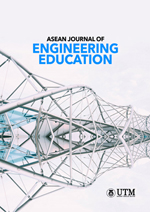Workshop Development for New Frontier of Mechatronics for Mobility, Energy, and Production Engineering
DOI:
https://doi.org/10.11113/ajee2024.8n2.163Keywords:
Mechatronics, Production Engineering, Workshop, Workforce DevelopmentAbstract
Mechatronics is a multidisciplinary engineering field that integrates mechanics, electronics, control theory, computer science, communications, power, and production manufacturing, reflecting the trend toward deep cross-disciplinary collaboration. With applications in e-mobility, connected and autonomous vehicles (CAV), robotics, and unmanned aerial vehicles (UAV), the expanding mechatronics industry demands a workforce with broad, multidisciplinary training. This paper details the activities and outcomes of an NSF-funded ECR: PEER (EHR Core Research: Production Engineering Education and Research) project, which organized two workshops at Wayne State University (WSU) and California State University Long Beach (CSULB). These workshops aimed to gather insights from experts across academia, industry, and non-profit sectors to shape the future of mechatronics education and production. Over two days, professionals addressed challenges in workforce development for production engineering in mechatronics, covering educational pathways, advancements in teaching methods, and the social impacts of mechatronics technology. The workshops had distinct focuses: WSU concentrated on ground mobility technologies, while CSULB emphasized aerospace applications. A survey conducted at the end of the workshops evaluated their effectiveness, with the results informing future improvements in mechatronics workforce education.



















